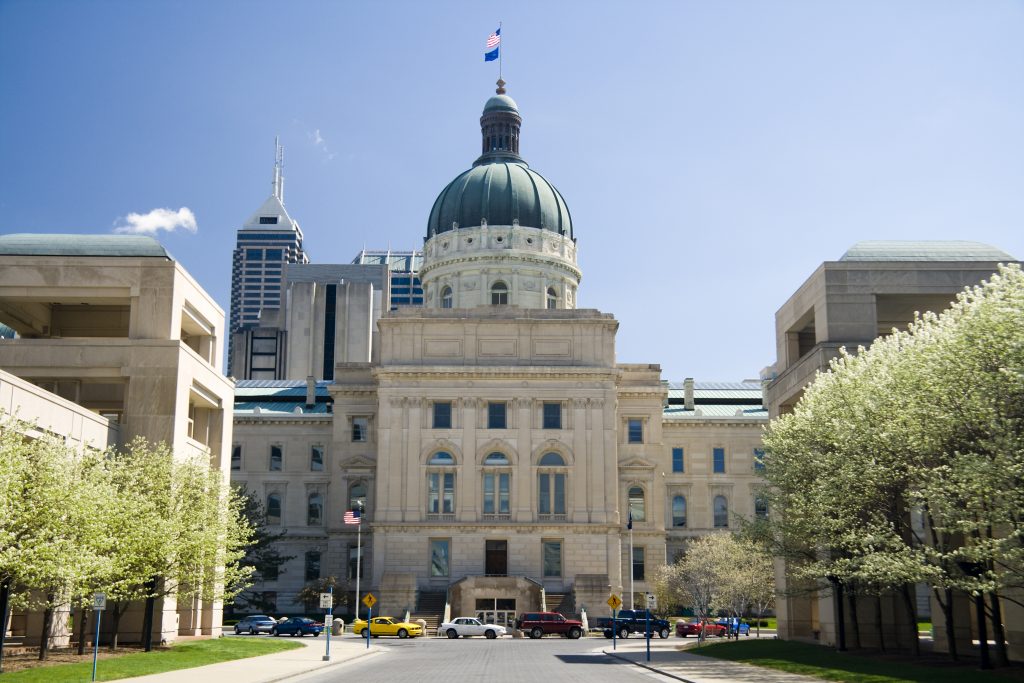Subscriber Benefit
As a subscriber you can listen to articles at work, in the car, or while you work out. Subscribe NowModerate your expectations for the next legislative session, say Indiana’s lawmaking leaders: more tweaks and fine-tuning, and fewer overhauls.
They’re not taking on gambling expansions, water fights or costly initiatives during the shorter non-budget session, which begins in January and must end by mid-March.
“We’ve had three aggressive sessions — three years in which we’ve accomplished a lot,” GOP House Speaker Todd Huston said Monday at the Indiana Chamber of Commerce’s annual legislative preview. “… We’ll probably take a pretty measured approach on what we address.”
That could include some more action on truancy and reading, after lawmakers last session mandated that schools teach the “science of reading” over other less-effective measures.
But don’t expect sweeping changes to career-focused education initiatives or to housing, they said, after last year’s massive plan to “reinvent” high school and revolving loan fund for housing development infrastructure.
“We need to allow things to be able to be implemented,” Huston said, although lawmakers could “fine-tune” some policies. Republican leadership will introduce fewer priority bills to signal that they’re of the “‘less is more’ opinion right now,” he added.
A quiet session?
Huston and other legislative leaders said they’re also not taking on new and controversial subjects like expanding gambling or regulating large water transfers.
Advocates have for several years wanted to legalize i-gaming but it’s unlikely to go anywhere this year.
Former Shelbyville Rep. Sean Eberhart agreed to plead guilty to a federal felony charge this month for supporting legislation benefiting Spectacle Entertainment in exchange for future employment. Another former senator and a casino executive were both sentenced in 2022 for gambling-related election finance schemes.
GOP Senate President Pro Tem Rodric Bray said Eberhart’s case “makes gaming really hard to engage in” and indicated that it could limit legislation for several sessions.
“It taints the Statehouse, it diminishes the confidence that people have in the integrity of the Statehouse, it causes an awful lot of problems and it makes it particularly difficult to engage in that kind of policy,” Bray said.
Bray and Huston said they hadn’t spoken with federal investigators and had no information on whether the ongoing investigation would involve more lawmakers.
And they’re not taking action on water, although some local units of government have bucked the Indiana Economic Development Corp’s plans to pipe millions of gallons of water daily from the Wabash Alluvial Aquifer to a massive high-tech development in Boone County.
Tippecanoe County on Monday approved a nine-month moratorium on large water withdrawals. Several other communities have passed symbolic rejections.
“The project is a fantastic project that promises to be really … transformational for Indiana,” said Bray, who said lawmakers haven’t “spent as much time on water as some other states … because we have had a lot of water, and we do have an awful lot of water.”
“We’re not going to take any other steps until we have an opportunity to study, to make sure that there’s ample water for the projects that we’re trying to bring into the state of Indiana and we understand just how much is too much to take away from a particular community,” Bray continued.
The Indiana Chamber of Commerce said it’s working on one such study, as is a contractor hired by the IEDC but now under Indiana Finance Authority oversight.
Chamber pushes non-budget priorities
The chamber, however, had plenty of suggestions for lawmakers in its annual list of priorities.
It said they should focus on child care by streamlining regulations, allowing child care workers to qualify for care vouchers and skills training, and look at subsidy data.
The organization also recommended building on recent career-focused education bills, increasing Medicaid reimbursement rates, expanding the scope of practice for low-level health care professionals, banning union-only project labor agreements, raising the business personal property tax exemption and requiring local governments to recognize state-level diverse business certifications.
And it doubled down on some previously unsuccessful initiatives, including an increase to the state cigarette tax and adding driving privilege cards for people who have immigrated without legal permission.
The Indiana Capital Chronicle is an independent, not-for-profit news organization that covers state government, policy and elections.
Please enable JavaScript to view this content.

